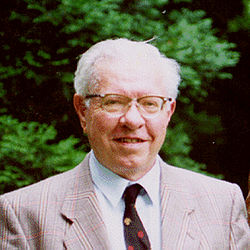Fred Hoyle
Sir Fred Hoyle FRS was an English astronomer noted primarily for the theory of stellar nucleosynthesis, but also for his often controversial stances on other scientific mattersin particular his rejection of the Big Bang theory, a term coined by him on BBC radio, and his promotion of panspermia as the origin of life on Earth. While Hoyle was wellregarded for his works on nucleosynthesis and science popularization, his career was also noted for the controversial positions he held on a wide range of scientific issues, often in direct opposition to the prevailing theories supported by the majority of the scientific community.
Hoyle was born near Bingley in Gilstead, West Riding of Yorkshire, England. His father, Ben Hoyle, worked in the wool trade in Bradford. His mother, Mabel Pickard, had studied music at the Royal College of Music in London. Hoyle was educated at Bingley Grammar School and read mathematics at Emmanuel College, Cambridge. In late 1940, Hoyle left Cambridge to go to Portsmouth to work for the Admiralty on radar research, for example devising a method to get the altitude of the incoming aeroplanes. He was also put in charge of countermeasures against the radar guided guns found on the Graf Spee. Britains radar project employed more personnel than the Manhattan project, and was probably the inspiration for the large British project in The Black Cloud. Two key colleagues in this war work were Hermann Bondi and Thomas Gold, and the three had many and deep discussions on cosmology. The radar work paid for a couple of trips to North America, where he took full advantage to visit astronomers. On
Source: Wikipedia

